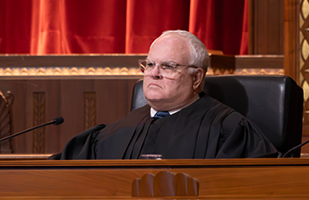Trash Is a Treasure for Assigned Visiting Judge

Tenth District Judge Michael Mentel hears his first Supreme Court oral argument.

Tenth District Judge Michael Mentel hears his first Supreme Court oral argument.
Judge Michael Mentel’s first memory about the intricacies of law comes from an unlikely source – trash.
“My father was director for the Solid Waste Authority of Central Ohio (SWACO). As a teen, I would hear him talk about it and was always fascinated about the regulations and the ‘why’ behind all those rules,” said Judge Mentel who has been on the Tenth District Court of Appeals for three years.
The curiosity behind the practices and rules led him to the law, and ultimately the bench, which now includes hearing his first case for the Supreme Court of Ohio.
After starting his career as a public defender, much of the judge’s 32 years as an attorney were dedicated to the complexities of environmental and energy matters. In some roles it was through criminal and trial representation, and in others it was compliance and how government agencies or companies adhere to regulations. Like his father, he held a leadership position at SWACO. Mentel served as its chief legal officer, earlier in his career. But Judge Mentel’s biggest contribution to waste management was with the Ohio Environmental Protection Agency. He worked with legislators to draft the Voluntary Action Program, which gives people a way to investigate possible environmental contamination, clean it up if necessary, and receive a promise from the state that no more cleanup is needed.
“Regulations are so detailed for the health, safety, and welfare of Ohioans. But each circumstance is not cookie cutter. Understanding how to interpret and then apply the law in these kinds of cases really gave me a great foundation on the bench,” said Judge Mentel.
The Tenth District jurisdiction is Franklin County. Based in Columbus, the court’s oversight for criminal and civil appeals includes a broad range of cases, some involving state agencies. In one day, he might review the case of an injured worker through the Ohio Industrial Commission or an appeal of the legality of an action by the Ohio Department of Agriculture.
“That wide range of cases and the parties involved can present so many issues and nuances of the law,” said Judge Mentel.
The technicalities of legal arguments are even more specific when they reach the Supreme Court. Today, Judge Mentel sat by assignment in place of Justice Melody Stewart, who recused. The Ohio Constitution gives the chief justice authority to select an appellate judge to sit for a Supreme Court case when there is a justice recusal. Chief Justice Sharon L. Kennedy assigned Judge Mentel to hear the case of Caldwell v. Whirlpool Corp., et al., which debates whether a man's claim for additional coverage by the Bureau of Workers' Compensation was within the statute of limitations.
“I am very honored and privileged for this opportunity. It’s the chance to pull strings apart and really understand the laws in question to make sure the decision is just for the parties and the other Ohioans it will impact,” said Judge Mentel.


